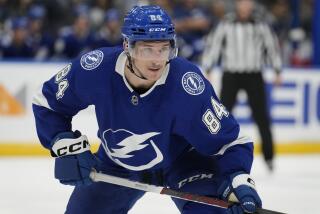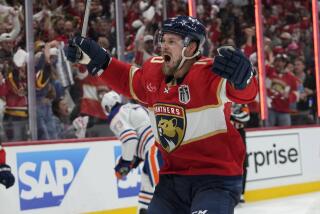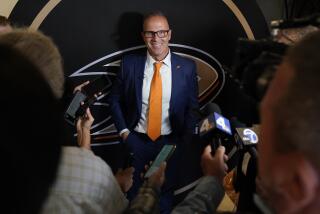Rocky Road Connects Coates With St. Louis
- Share via
Al Coates always believed Martin St. Louis could succeed in the NHL. Coates just didn’t foresee the detours they’d both take before it happened.
Coates was the general manager of the Calgary Flames when Nick Polano, then the club’s director of hockey operations, called with news of an electrifying right wing he’d seen in the International Hockey League all-star game. It was St. Louis, who’d had good numbers in four years at the University of Vermont but wasn’t drafted by NHL teams because he was merely 5 feet 9 and 185 pounds.
“Nick said, ‘There’s this guy here, he’s not very big, but he’s terrific,’ ” Coates said. “The worst-case scenario was, we figured he’d help our farm team.”
They signed St. Louis (pronounced Sen Lou-EE), who averaged a point a game for their affiliate in St. John, Canada, in February 1998 and gave him a chance to win a job with the big club in 1999-2000.
“It was the year Valeri Bure scored 75 points for us and outside of Valeri Bure, Martin St. Louis had the most scoring opportunities of anybody on our team. The chances he got were by driving to the net and cutting to the net, but he’d just miss. You’d hit your fist down on the press box every time.
“The stats don’t indicate it [three goals and 18 points in 56 games] but he was everything you wanted in a player. He had drive, determination, hockey sense, natural ability and skill, all the things that make a great player, and desire to help the team. But I was gone [soon after] and somebody else didn’t keep him, and the rest is history.”
Coates was fired in April 2000, after nearly 20 years with the club, and worked in the New York Ranger organization before becoming the Mighty Ducks’ senior vice president for business operations. His successor in Calgary, Craig Button, let St. Louis walk away as a free agent, but the Tampa Bay Lightning signed St. Louis on July 31, 2000.
Four good seasons and one NHL scoring title later, St. Louis has become the player Coates thought he’d be, earning strong consideration for most-valuable-player honors as he led the Lightning to the top record in the East this season. Coates is delighted for St. Louis, who scored his first two of the playoffs Monday.
“He’s a small man but he’s stocky,” Coates said. “His legs are thick and he’s got an explosive skating style, and the fact he has such a low center of gravity makes him tough to knock down.
“But his success is more about his tenacity in playing this game. He’s like [Theo] Fleury and [Buffalo’s] Daniel Briere, because they all have speed, quickness, agility and the ability to escape checks, but Briere is going to stay more in open ice. Fleury and St. Louis play with reckless abandon.
“They go in the corners with guys who are 6-4 and 6-5 and they’re in and out before they can get hit.”
Coates also said enough time had passed and enough changes had occurred in Calgary for him to be happy the Flames made the playoffs this season for the first time since 1996. They trail in their first-round series against Vancouver, 2-1.
“I like the city a lot, and people there have been waiting for this for a while,” he said. “Had the change not been made, we would have been there as an organization before now. We were ahead of Vancouver at that time, the spring of 2000, in both attitude and organization. But they decided to make the change and you move on.”
And in St. Louis’ case, move up.
Say It Ain’t So, Joe
Boston Bruin center Joe Thornton has been suffering from an odd impairment that crops up in the NHL every spring: the dreaded upper-body injury.
Most teams are secretive about injuries during the season but become even more tight-lipped during the playoffs, fearing opponents might target players’ sore spots. Guesses on what’s really ailing Thornton have ranged from an injured wrist to sore ribs, and since the NHL has no rules obligating teams to be specific in reporting injuries, anything’s possible.
Whatever’s wrong, Thornton is hurting. So are the Bruins, who aren’t getting anything from their top line against the Canadiens. Thornton and Glen Murray have no goals in three games, and Mike Knuble scored his power-play goal while playing with other linemates.
Michael Nylander’s absence Sunday at Montreal compounded the Bruins’ problems. They said the Swedish center, who had four points in the first two games centering for Sergei Samsonov and Patrice Bergeron, didn’t play because of flu. However, Boston reporters speculated he might have suffered a concussion after being crunched by Steve Begin in Game 2.
If he’s still missing today, and if Thornton can’t carry the puck well enough to set up his wingers, the Bruins could be in trouble. Especially if Alexei Kovalev’s two-goal performance Sunday was a sign he’s motivated to use the speed and skill that make him so dangerous.
Talking Points
The NHL and the players’ association have reserved four days, April 29 and 30 and May 24 and 25, for their next collective bargaining talks. They haven’t had substantive discussions since Oct. 1, when a meeting in Toronto ended rancorously and set off months of verbal sparring over “cost controls” and whether the league was truthful in stating its losses last season at nearly $300 million.
Bill Daly, the league’s chief legal counsel, said in an e-mail he would have a “pre-meeting” next week with Ted Saskin, the NHLPA’s senior director, and outside lawyers representing both sides to discuss the potential agenda and topics for discussion at the formal meetings.
The current collective bargaining agreement expires Sept. 15, and many players have said they’re prepared for a long lockout. Ranger winger Jaromir Jagr told reporters at the end of his team’s season that he’s planning to play in Russia if the NHL season is delayed, and other players might follow him overseas.
Here and There
Andy VanHellemond, the NHL’s director of officiating, convened a conference call before the playoff openers to remind referees to be vigilant about obstruction.
So far, they’re obeying. They’ve made calls late in close games that have driven hometown-shill announcers nearly to tears. If something is a penalty in the first period, though, it should be a penalty in the third, and it’s being called that way.
Of course, every season starts with the same intent to ban obstruction but it’s never carried out long enough.
The statisticians for “Hockey Night in Canada” came up with a terrific note after Boston goalie Andrew Raycroft had shut out Montreal in his playoff debut. Three commentators on “Hockey Night” are former goalies, Kelly Hrudey, Greg Millen and Glenn Healy. Among them, they played 181 playoff games without recording a shutout. Apparently, those who can, do. Those who can’t, become commentators.
The reincarnated World Hockey Assn. plans meetings next week in Toronto to solidify its plans for a launch in late November or early December.
“As for L.A., I’m not sure where we stand right now,” Executive Director Timothy Keighan said.
The Canucks have defenseman Mattias Ohlund shadowing Calgary’s Jarome Iginla, with generally good results. Iginla has one goal, as many as enforcer Krzysztof Oliwa, and was frustrated enough to tussle with Ohlund late in the Flames’ 2-1 loss Sunday.
Igor Larionov turned down the chance to be the general manager of Team Russia in the World Cup of Hockey because Russian officials rejected his suggestion that Larry Robinson be appointed coach.
Kudos to the University of Denver for winning the NCAA men’s hockey championship. Players wore a patch on their uniforms in honor of Keith Magnuson, who died in a car crash last December and was a member of the last Denver University team to win the title, in 1969.
More to Read
Go beyond the scoreboard
Get the latest on L.A.'s teams in the daily Sports Report newsletter.
You may occasionally receive promotional content from the Los Angeles Times.







